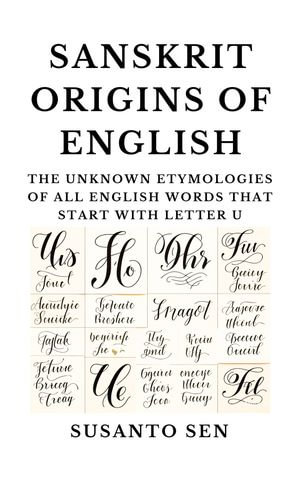
eBOOK
Sanskrit Origins of English
The Unknown Etymologies of all English Words that start with Letter U
By: Susanto Sen
eBook | 10 February 2025
At a Glance
eBook
$6.86
Instant Digital Delivery to your Booktopia Reader App
Read on
Many people can speak multiple languages, some of which could be foreign ones. A person may not be from England if he speaks English, and it may not also mean that his parents or ancestors were from England. By analogy, this could be equally true with respect to the natives and speakers of other languages as well. If people do speak foreign languages, it doesn't alter their genetic material in any way. People across borders of many countries share the same genes, but they speak different languages. Although genes do determine the ability to speak or the aptitude to learn a language, genes do not actually determine the specific languages that one speaks. For this reason, it would be incorrect to link genetics to the origin and migration of languages or to the evolution of languages. Even archaeology has its drawbacks when it comes to answering questions about the origin and dissemination of languages. Archaeology suffers from at least three issues. Excavated materials are usually not sufficiently large, unbiased, and representative especially when a long period of time has elapsed. Moreover, interpretations of archaeological artifacts are very subjective. Nothing much can be inferred about the origin of languages using archaeology, although it can certainly be known if some languages are ancient or not. However, the oldest artifact of a language doesn't determine the age of a language. An old surviving artifact can be dated only to know if the language existed during a certain period. But the time of its origin cannot be known using the artifact.
Etymology is the only means of knowing the relationship between languages, and which among them is the oldest. Etymology is a philosophy which requires the deep study and comparison of words of various languages. By such studies, a descendant language can be distinguished from a parent language. This book mentions twenty-six criteria which differentiate a parent language from a descendant language. Also, it provides references from Nirukta, the ancient treatise on Vedic etymology written by Y?ska, an ancient Indian grammarian, linguist, and etymologist of 7th century BCE or earlier. The treatise provides evidence that Sanskrit had developed independently and did not borrow words from other languages. The nouns of various languages which have descended from Sanskrit have verbal roots which ultimately originate from Sanskrit. For example, the English noun dragoon, meaning "a cavalryman who rides horseback" originates from the Sanskrit word turagin (???????), meaning "horseman," that comprises of the Sanskrit verb roots turaga (????), meaning "going quickly" and ina (??), meaning "able, master, lord." The primary meaning of the Sanskrit word turaga (????), is "going quickly" and the Sanskrit functional meaning of it is "horse." The language of the word which conveys the primary meaning is the language of origin. The book also discusses the flaws of proto-languages and the language families derived using the non-existing proto-languages.
This book provides the ultimate origins of all English words which start with Letter U. In this book, a large number of hitherto unknown etymologies have been deciphered, and a large number of incorrect etymologies have been redressed. This book also provides evidence that a large number of languages of this world have originated from Sanskrit.
Read on
ISBN: 1230008770677
Published: 10th February 2025
Format: ePUB
Language: English
Publisher: Susanto Sen
























